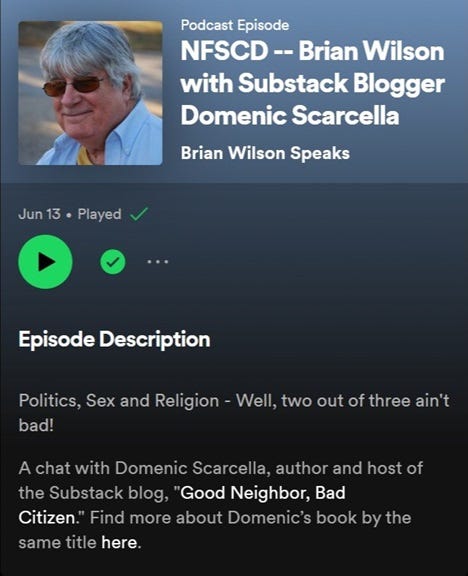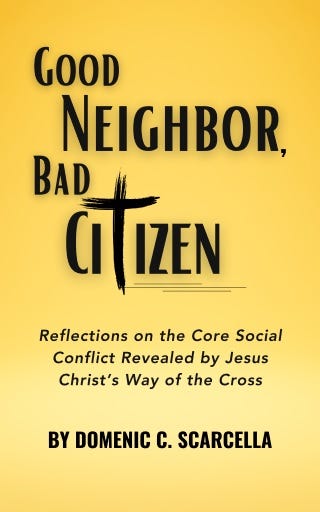All Governments Are Religions …
… But Are All Religions Also Governments? Some Help From Podcasts, Squares & Rectangles

You ever find yourself in a stimulating conversation, and then shortly afterward think of something clever you should’ve said to make a point even more clear?
Happened to me last week, when I was the guest on Brian Wilson’s “Now For Something Completely Different” (NFSCD) show for Thursday, June 13, 2024, available on Spotify and right here at Substack.

Brian brings several decades of big-market radio broadcasting experience to his streaming shows, and he uses a shorter, quicker-hitting conversation style than many of the longer-form shows I’ve appeared on. In this regard, NFSCD is similar to a show hosted by a Bryan of a different spelling: Bryan Hyde, whose self-titled podcast I guested on in early February.
NOTE: You can find all my podcasts in this list (updated this week with two more shows!):
Brian Wilson started right away with the New York City rapid-fire wit — his good-natured snark when introducing me is worth the listen all by itself! — and within a few minutes we were into defining religion and its perhaps troubling relationship to government.
Is there a difference?
Eventually, I dropped the hammer on supposedly “secular” government:
Government, dating back thousands of years, has always been religious. Always.
Brian pressed me on the point — which I welcomed, because such a remark should be explained rather than blindly accepted — and I elaborated:
In order to create an imposed hierarchical social order, which is what a government is — in order to create and adhere to a monopoly-violence institution, which is what a government is; a coercive civil authority, which again is what a government is — you have to believe certain things about that.
You have to believe in the inherent inequality of such a thing. You have to believe that it is beneficial and at least purposeful for keeping order. So government has always been religious. A bunch of people in the U.S. got fooled into thinking that somehow it wasn’t [religious]. … [But] try not standing for the pledge of allegiance somewhere. Try not singing the national anthem. You’ll find out very quickly that government is religious.

Brian wondered about swapping government and religion in that construction. Couldn’t you observe that religions are basically governments in how they operate?
And that’s when I wish I had thought of the analogy of squares and rectangles.
All squares are rectangles, but not all rectangles are squares
My answer in the flow of conversation:
All religions are, in a sense, looking to impose their beliefs in a hierarchical structure, yes. That’s what made early Christianity — the Early Church, pre-Constantine — so different. And that’s the Christianity that I delve into in the book and try to keep alive in my analysis in the Substack articles.
I should’ve said “almost all” or “many of the most visible” instead of “all” at the start of that thought; I was saying it in my mind, but my mouth didn’t get the message quickly enough!
The analogy would’ve helped: All squares are rectangles, but not all rectangles are squares.
Rectangles are four-sided shapes in which the sides are straight lines and all angles are right angles (90 degrees). All squares fit these parameters, but squares add something that isn’t found in other rectangles: all sides must be the same length.
Similarly, let’s look at religions. I gave a fairly good, short-ish definition early in the interview:
“Religion” is from an old Latin word, meaning “to bind together.” It’s how people connect with each other, usually around faith, very essential beliefs about humanity and purpose.
All governments fit these parameters, but governments add something: the infliction of harm and the credible threat of harm, with the aim of imposing and maintaining hierarchical social order. Only a belief system that includes this call to order-worshiping violence will be properly understood as “government.”
All governments are religions, but not all religions are governments.
Jesus knows — and practices! — the difference; do you?
In the Bible, Jesus is shown modeling and teaching the good of religion without all the evil of governments. Jesus implores people to the deepest parts of humanity and purpose and social connection, but actively undermines the control-worshiping aspects of imposed hierarchical social orders, coercive civil authority, and monopoly-violence institutions.
This demonstrates that Christianity is politically anarchist/voluntarist. And as I said during NFSCD, exploring this is the basis for my book, Good Neighbor, Bad Citizen (Amazon, B&N, Lulu), and Substack!
If I didn’t believe it myself, I wouldn’t be here doing this. And I suspect that if you’re reading this, you’re also curious about being genuinely religious without having to worship a government (or a wanna-be government).
Let’s keep encouraging each other to be truly good neighbors, knowing it’ll inevitably make us bad citizens.
All Comments are encouraged, even though not all encouragement is in the Comments …
Enough of me sharing my thoughts; let’s hear from YOU!
What did you think of this podcast? What part(s) stood out the most to you?
Did I flub the answer to the “All religions are governments?” question? Is it good that I clarified what my mind wanted to say, or is it still awkwardly missing the mark?
Did you know about the co-emergence of government and religion through human history? Do you see modern government as still being religious in nature? Why or why not?
What about the square-rectangle analogy? Helpful, or should I have tried something else?
What else “strikes your fancy” about today’s theme?
Leave a Comment below …






Loved this essay. (and thanks for the shout out) Your observation about how people react to someone opting out of the pledge or national anthem is spot on.
Well, I do live in a Kingdom that is here and not yet. And that sounds like a government to me. Now, my king isn't coercive and subverts violence.